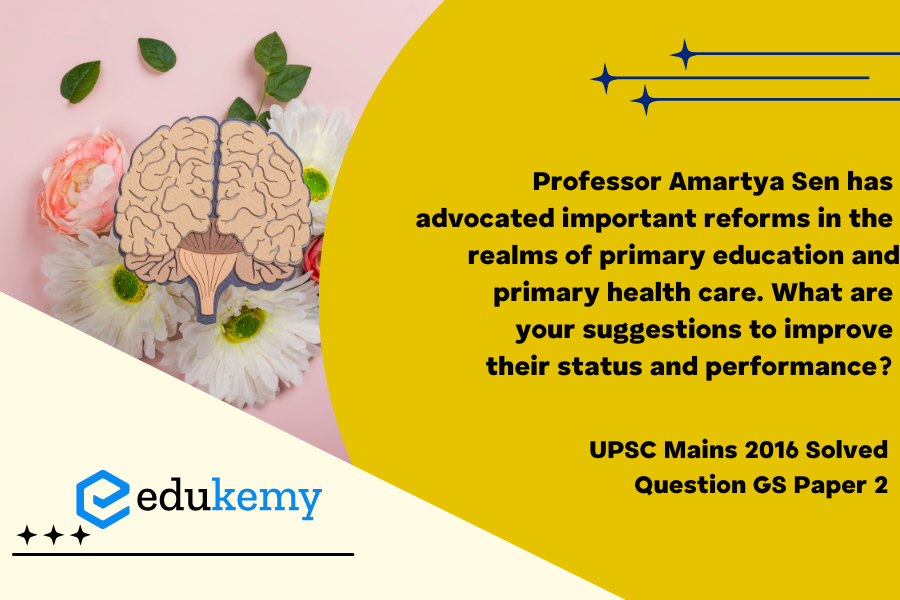Professor Amartya Sen, a distinguished economist and Nobel laureate, has been a vocal advocate for transformative reforms in primary education and primary health care. Recognizing the pivotal role these sectors play in shaping the overall well-being and development of societies, Sen’s recommendations emphasize the need for comprehensive improvements. To enhance primary education, prioritizing universal access, quality teaching, and infrastructure development is essential. Adequate funding, teacher training programs, and innovative teaching methods can contribute to a more inclusive and effective educational system. Additionally, leveraging technology for remote learning and addressing socioeconomic disparities can bridge educational gaps.
In the realm of primary health care, Sen underscores the importance of accessible and affordable healthcare services. Strengthening the healthcare infrastructure, ensuring the availability of essential medicines, and expanding preventive measures are key components of his proposed reforms. Furthermore, community involvement and awareness programs can play a vital role in promoting health-seeking behavior. Collaborative efforts between governments, non-governmental organizations, and local communities are crucial for implementing and sustaining these reforms. By prioritizing these areas and adopting a multi-dimensional approach, societies can progress towards achieving Sen’s vision of a more equitable and flourishing society through improved primary education and healthcare.
Tag: Government policies and interventions for development in various sectors and issues arising out of their design and implementation.
Contents
Decoding the Question:
- In the Introduction, can start by writing about the importance of education and health sectors and reforms suggested by Professor Amartya Sen.
- In Body, suggests various reforms to improve the performance of both sectors.
- In Conclusion, summarize the answer.
Answer:
India needs to broaden its base in the spheres of education, healthcare, and women’s equality to foster economic growth, said Nobel laureate Amartya Sen.
Professor Amartya Sen has lamented the primary education and healthcare situation in India and advocated for reforms, which stress universal health coverage and immunization, as well as increasing public spending on health and education to enable proper human development. Without developing social sectors like school education and basic healthcare services carrying out land reforms, India can’t possess participatory and widely shared economic growth.
Reforms to Improve the Performance of Education Sector:
- Quality Teachers: Invest in teacher training programs to enhance the quality of education. Well-trained teachers are crucial for providing effective instruction and promoting student engagement.
- Curriculum Enhancement: Develop a relevant and modern curriculum that aligns with the needs of the changing world. Incorporate critical thinking, problem-solving skills, and practical knowledge into the curriculum.
- Digital Learning: Integrate technology into education to enhance learning experiences and provide access to a wider range of educational resources.
- Early Childhood Education: Focus on early childhood education to provide a strong foundation for lifelong learning. This can have a significant impact on cognitive development and future academic success.
- Inclusive Education: Ensure that education is accessible to all children, including those with disabilities and from marginalized communities. Implement inclusive policies and provide necessary support for their learning needs.
- Community Engagement: Involve parents and communities in the education process. Their participation can lead to improved school management, better accountability, and increased awareness about the importance of education.
- Infrastructure and Facilities: Upgrade school infrastructure to provide a conducive learning environment. Adequate classrooms, libraries, laboratories, and sanitation facilities are essential for quality education.

Reforms to Enhance Primary Healthcare:
- Strengthening Healthcare Infrastructure: Invest in healthcare facilities, especially in rural and underserved areas. Ensure that primary healthcare centers are well-equipped and staffed.
- Healthcare Workforce: Train and retain healthcare professionals, including doctors, nurses, and paramedical staff, to provide quality care. Incentives and support can encourage them to work in remote areas.
- Preventive Care: Emphasize preventive measures through public health campaigns, vaccinations, and awareness programs. Preventive care can reduce the burden on the healthcare system.
- Community Health Workers: Train and deploy community health workers to provide basic healthcare services, health education, and referrals to higher-level facilities.
- Telemedicine: Utilize technology for remote consultations and medical advice, especially in areas with limited access to healthcare services.
- Focus on Maternal and Child Health: Prioritize maternal and child health services, including prenatal care, immunizations, and nutrition programs. Healthy mothers and children contribute to overall community well-being.
- Health Insurance and Financing: Develop and promote health insurance schemes to provide financial protection to individuals and families during medical emergencies.
- Data and Monitoring: Establish robust data collection and monitoring systems to track health indicators and identify areas for improvement.
- Integration of Services: Integrate primary healthcare with other sectors like nutrition, sanitation, and education. A holistic approach can address interconnected health and well-being issues.
- Health Literacy: Promote health literacy and awareness among communities to encourage healthy practices and prompt seeking medical care when needed
Effective implementation of existing policies for skill development, fundamental education reforms, public-private partnerships, and international collaborations can help the State to become a worldwide superpower. Well-targeted initiatives in primary healthcare and education systems can improve the health and skills of individuals and populations, which can, in turn, have a positive impact on macro-economic indicators, such as employment rates, productivity, and economic growth.
In case you still have your doubts, contact us on 9811333901.
For UPSC Prelims Resources, Click here
For Daily Updates and Study Material:
Join our Telegram Channel – Edukemy for IAS
- 1. Learn through Videos – here
- 2. Be Exam Ready by Practicing Daily MCQs – here
- 3. Daily Newsletter – Get all your Current Affairs Covered – here
- 4. Mains Answer Writing Practice – here


